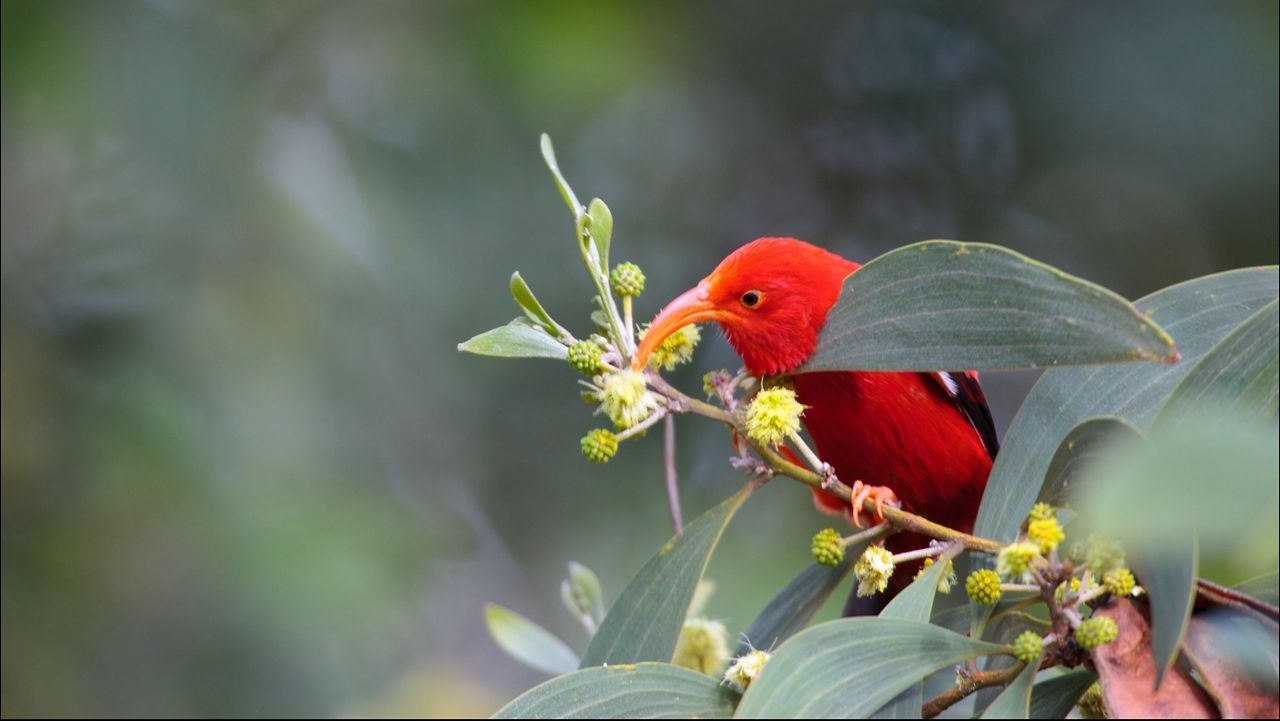The U.S. Fish and Wildlife Service proposed 275,647 acres of land be designated as critical habitat for the ‘i‘iwi, according to a news release.
The proposal comes after the Center for Biological Diversity sued the federal agency for not designating critical habitat after the species was listed as threatened.
‘I‘iwi are endemic to Hawaii, meaning they are only found in the island state. The honeycreepers have red feathers, black wings and long, curved orange beaks.
The birds were once a common sight in Hawaii. However, the species was listed as threatened under the Endangered Species Act in 2017.
‘I‘iwi now live mostly on Hawaii Island, Maui and Kauai, with small populations still found on Oahu and Molokai. The birds are no longer found on Lanai. Without help, researchers predict the population on Kauai will likely go extinct by 2050.
The birds are threatened by avian malaria, a mosquito-borne disease that kills 95% of ‘i‘iwi that are bitten. ‘I‘iwi once lived in low-elevation forests but now only survive in higher elevation native forests that are too cold for mosquitoes. However, climate change is affecting this, allowing mosquitoes to reach higher grounds — and more quickly than anticipated.
‘I‘iwi are also under threat because ‘ōhiʻa trees, where these birds build nests and feed on the nectar of their blossoms, are being killed by Rapid ‘Ōhiʻa Death, an invasive fungal disease.
The proposed lands include federal, state and private lands on Hawaii Island, Maui and Kauai. Federal agencies are prohibited from destroying or adversely modifying critical habitat.
“Designating critical habitat is an important step towards saving ʻiʻiwi,” said Lasha-Lynn Salbosa, a team manager with the Pacific Islands Fish and Wildlife office, in a news release. “Mosquito-borne diseases like avian malaria remain the biggest threat to ʻiʻiwi and other native forest birds. Designation of critical habitat will allow greater access to tools for our federal, state, and other partners to manage and protect these species.”
While the Endangered Species Act requires the U.S. Fish and Wildlife Service to designate critical habitat and create a recovery plan for listed species, the proposal for the ‘i‘iwi comes only after the Center for Biological Diversity sued the federal agency in 2021 for not doing so in a timely manner.
“It shouldn’t have taken a lawsuit, but the Service made the right call,” said Maxx Phillips, Hawaii director and staff attorney at the Center, in a news release. “As our forests fall quiet, federal officials must do everything possible to ensure these birds bounce back and stop sliding toward extinction.”
Phillips told Spectrum News Hawaii the critical habitat designation is a result of the settlement the Center for Biological Diversity reached with the U.S. Fish and Wildlife last year.
When asked by Spectrum News Hawaii why the U.S. Fish and Wildlife proposal for critical habitat was completed only after the Center for Biological Diversity’s lawsuit, Salbosa replied: “Among our 586 species listed as threatened or endangered in the Pacific Islands, oftentimes we are data limited, meaning we do not yet have a full understanding of the life history needs and landscape requirements of the species.”
“We are also resource limited, where other statutory obligations and species conservation needs preclude critical habitat determination at that specific time,” she added.
Earlier this month, the Department of Interior released a separate plan to fight the extinction of Hawaii’s forest birds imperiled by avian malaria. The multi-agency strategy includes more than $14 million in funding from President Joe Biden’s Bipartisan Infrastructure Law.
Two-thirds of the islands’ honeycreepers have gone extinct since humans came to Hawaii and now only 17 species survive. Four honeycreepers — ‘akikiki (Kauai honeycreeper), ‘akeke‘e (Hawaiian honeycreeper), ‘ākohekohe (crested honeycreeper) and kiwikiu (Maui parrotbill) — may go extinct in the next 10 years.
State officials are also working on a “mosquito birth control” program that would introduce male mosquitoes that carry bacteria, which makes them unable to produce viable offspring, in order to reduce mosquito populations.
The U.S. Fish and Wildlife is holding a virtual public information meeting and hearing on the proposed critical habitat designation for ‘i‘iwi on Feb. 10, 2023, from 6 to 8 p.m. Register for the meeting at the Pacific Islands Fish and Wildlife Office’s website.
The proposed rule will be available for public comment for 60 days. View the document on the Federal Register. Submit comments online and adhere to the instructions listed on the docket.
Michelle Broder Van Dyke covers the Hawaiian Islands for Spectrum News Hawaii. Email her at michelle.brodervandyke@charter.com.



